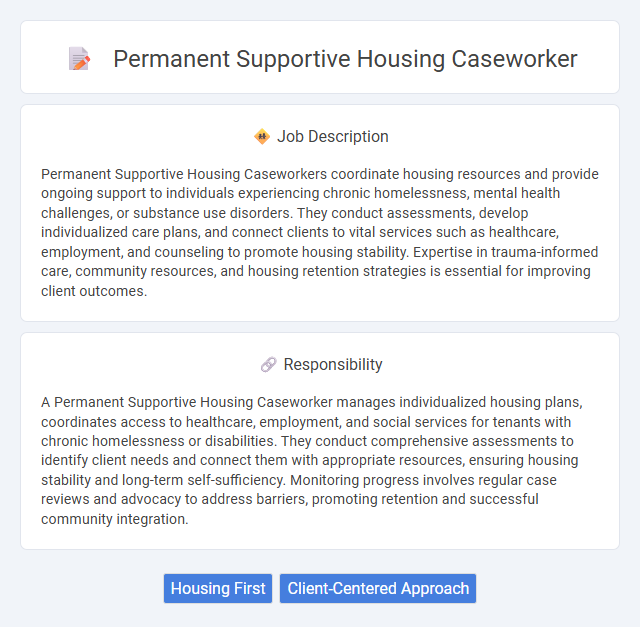
Permanent Supportive Housing Caseworkers coordinate housing resources and provide ongoing support to individuals experiencing chronic homelessness, mental health challenges, or substance use disorders. They conduct assessments, develop individualized care plans, and connect clients to vital services such as healthcare, employment, and counseling to promote housing stability. Expertise in trauma-informed care, community resources, and housing retention strategies is essential for improving client outcomes.
People experiencing chronic homelessness, mental health challenges, or substance use disorders may be suitable candidates for a Permanent Supportive Housing Caseworker position due to the role's focus on providing ongoing support and resources to stabilize their lives. Those with strong empathy, patience, and problem-solving skills could likely thrive in this job, as it involves navigating complex social service systems and building trust with vulnerable individuals. Candidates lacking resilience or comfort in high-stress environments might find the demands of this role challenging and less compatible with their abilities.
Qualification
A Permanent Supportive Housing Caseworker must possess a minimum of a bachelor's degree in social work, psychology, or a related human services field, with experience in case management or supportive services preferred. Strong knowledge of community resources, mental health services, and housing assistance programs is essential for effectively aiding clients facing homelessness or chronic health issues. Proficiency in maintaining client records, performing assessments, and developing individualized service plans is critical to ensure long-term housing stability and client well-being.
Responsibility
A Permanent Supportive Housing Caseworker manages individualized housing plans, coordinates access to healthcare, employment, and social services for tenants with chronic homelessness or disabilities. They conduct comprehensive assessments to identify client needs and connect them with appropriate resources, ensuring housing stability and long-term self-sufficiency. Monitoring progress involves regular case reviews and advocacy to address barriers, promoting retention and successful community integration.
Benefit
Permanent Supportive Housing Caseworker roles likely offer significant benefits including fostering long-term housing stability and improving clients' overall well-being. The position may provide opportunities to develop expertise in social services, mental health support, and community resources, which could enhance career growth. Supporting vulnerable populations might also increase job satisfaction through meaningful impact and community engagement.
Challenge
Permanent Supportive Housing Caseworkers likely face the challenge of balancing the complex needs of clients with limited resources, which may require strong problem-solving skills and resilience. Navigating bureaucratic obstacles and securing consistent funding for housing programs can present ongoing difficulties. Managing high caseloads and addressing clients' mental health or substance abuse issues could further complicate their efforts to provide stable, long-term support.
Career Advancement
A Permanent Supportive Housing Caseworker plays a crucial role in assisting individuals experiencing chronic homelessness by providing ongoing support and connecting them to essential resources. Career advancement opportunities often involve progressing to supervisory roles, such as Case Manager Supervisor or Program Coordinator, where leadership and program development skills are emphasized. Gaining certifications in social work, mental health, or housing services can further enhance promotion prospects and sector expertise.
Key Terms
Housing First
Permanent Supportive Housing Caseworkers specialize in delivering Housing First services that prioritize immediate access to permanent housing without preconditions. They coordinate wraparound supports, including mental health counseling, substance use treatment, and employment assistance to ensure housing stability. The role demands expertise in trauma-informed care and collaboration with community resources to prevent homelessness recidivism effectively.
Client-Centered Approach
Permanent Supportive Housing Caseworkers implement a client-centered approach by tailoring services to meet the unique needs of individuals experiencing homelessness and chronic health conditions. They coordinate housing, healthcare, and social services to promote stability, emphasizing empowerment and self-sufficiency. This approach improves long-term housing retention and enhances overall well-being for vulnerable populations.
 kuljobs.com
kuljobs.com